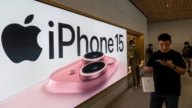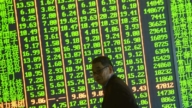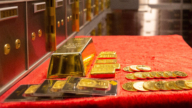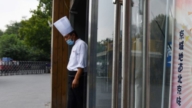【新唐人2013年06月28日讯】中国银行的“钱荒”风波越演越烈,引起国际社会的关注。日前,诺贝尔奖得主,经济学家蒙代尔(Robert Mundell)指出,中共应对“钱荒”的方式相当奇怪。下面我们来看看专家的分析。
周一,中国大陆“央行”说,希望银行保持“稳定适当”的信贷增长。这对诺贝尔奖得主、经济学家蒙代尔(Robert Mundell)来说,似乎是“央行”因为中国银行多年来的大量放贷,而对银行进行的“惩罚”。
日前,在香港接受美国《华尔街日报》采访的蒙代尔说,收紧资金,更多的是宏观经济上的问题,而信贷紧缩会削弱经济扩张,不利于增长。蒙代尔认为,流动性资金短缺会给中国经济带来威胁。
美国“南卡罗莱纳大学”艾肯商学院教授谢田表示,中共一方面担心经济“硬着陆”,一方面又要收紧信贷,这是自相矛盾的。这就是为什么蒙代尔觉得奇怪的原因所在。
美国南卡罗莱纳大学艾肯商学院教授谢田:“它(中共当局)也知道中国经济泡沫、房地产的泡沫、实体经济在基建投资上的浪费,还有很多钱进入金融界,在进行大量的投机。他们(央行)用的手段就是收紧银根,这在美国经济学家来看,他们如果不知道中共背后有这么多不能够见人的秘密,那么多造假,他就会觉得非常奇怪。”
谢田指出,中国银行的过度借贷,把大量金钱投入金融的投机和房地产上,没有进入到对国计民生有效的实体经济领域,再继续下去的话,房地产泡沫会破灭,金融泡沫也会破灭。
当前,中国的“钱荒”同样引起香港业内人士的关注。《香港经济日报》日前的一篇评论文章指出,中共国务院总理李克强以“钱荒”为突破口,借势整顿银行,和深化金融改革。
文章指出,中国存在金融机构业务和资金的严重“错配”,但是除了“错配”严重外,更严重的是,近年银行存在信贷质量下降、资金周转率低的问题,这些都引起了李克强等决策层的注意。
评论还分析,影子银行(地下钱庄)和各种理财产品一旦出现大面积危机,中国将出现金融系统性崩盘的风险,进而将经济拖入深渊。
“国务院发展研究中心”的经济学家李佐军曾经指出,中共新一届领导人将面临两种选择,一种是把之前的经济泡沫再接过去,再精心维护,最迟能维护到2015年、 或2016年,那时会是一个更大的危机。另外一种选择是拒绝接受这个泡沫,让这个泡沫破掉。虽然会带来一段时间的痛苦,但是,对于新的领导人来说是好事, 因为责任很清楚,不是他们造成的。李克强选择了后者。
谢田认为,李克强会不会以“钱荒”为突破口,借机整顿银行,或者是推进他所需要的金融改革,有几种可能性。一是,下面的银行不能听从他的管辖了﹔另一个可能是,李克强不想继承前任江泽民、胡锦涛时代中国经济的巨额麻烦,想把这个巨大的包袱放下来,作一个了结,重新开始。
谢田:“第三个原因,中国的钱都通过共产党官员,既得利益集团,多次转手,现在都聚拢在这些高干子弟和特权利益阶层他们所控制的那些企业,他们可以拿这些钱出去,可以到海外去投资,(用)这些钱在影子银行和金融圈子里来炒作,这就会造成中国确实金融界流动性不足,不得不逼着中央银行进一步放松银根,甚至推出更大面额的钞票,使中国的通货膨胀一发不可收拾。”
谢田认为,目前中共担心的是民众去银行提钱挤兑,因此,当局还是继续往银行砸钱来制造经济泡沫。
采访编辑/常春 后制/王明宇
Nobel Prize Winner: Strange Credit Crunch For China
The money shortage of Chinese banks is worse,
attracting the world’s attention.
Robert Mundell, Nobel Prize-winning economist said that the
Chinese Communist Party (CCP) is not really dealing with it.
Let’s take a look.
On June 24, China’s Central Bank said that they hope
banks maintain “stable and appropriate” credit growth.
However, Robert Mundell said that the Central Bank’s
years of lending has resulted in this punishment.
Recently, Mundell told the Wall Street Journal in an interview
in Hong Kong that tightness of money is more macroeconomics.
The credit crunch is going to cut down expansion and growth.
Mundell believes that the shortage of liquidity is starting
to create a threat to China’s economy.
Xie Tian, professor at Aiken Business School of the
University of South Carolina said that on one hand,
China worries about an economic hard landing;
on another hand, the CCP wants to cut down the funds,
both are contradictory.
This made Mundell feel things are a bit strange.
Xie Tian: “The CCP knows the economic bubble, real estate
bubble, and investing on infrastructure is wasteful.
A lot of money runs into the financial sector for speculation.
They (the Central Bank) deal with it by tightening the money.
For many US economists, if they don’t know there are so many
secrets and frauds behind the CCP, they will feel it strange.”
Xie Tian said China’s banks were wildly lending money that
was invested on financial sectors and properties, but not on real economy areas.
By continuing to do so, the property and
financial bubble will burst.
At present, China’s “money shortage” is also worrying
people in Hong Kong.
Hong Kong Economic Times published a commentary saying
that Premier Li Keqiang used “money shortage” to break point
to rectify banks and deepen financial reform.
The article said that businesses and financial institutions
in China have a serious “mismatch”.
More seriously, loan quality from banks has declined.
The problem of low liquidity drew the attention of
Li Keqiang and CCP decision-makers.
The article analyzed that “shadow banking” and other financial
processes could become a widespread crisis.
Then China’s financial system risks collapse,
and its economy will drop into the abyss.
Li Zuojun, economist in China’s Development Research Centre,
State Council, said the CCP new leadership faces two choices.
One is to carry on the current bubble economy and keep it
until 2015 or 2016 By then, a bigger crisis will occur.
Another one is to refuse the bubble and let it burst.
Although it will suffer the pain for a while it is a good
thing for new leadership.
It can make clear that they themselves didn’t cause the
bubble situation. Li Keqiang chose the later.
Xie Tian asks if Li Keqiang will use “money shortage” as a
means to rectify the banks, or implement financial reform.
Firstly, will banks listen to him? Secondly, Li likely doesn’t
want to accept huge economic troubles that Jiang Zemin and Hu Jintao left;
he wants to put down and settle these burdens.
He wants to start fresh.
Xie Tian: “Thirdly, China’s wealth has been transferred many
times from one official to another within the CCP interest groups.
Now it gathered in the companies controlled by princelings
and privilege groups.
They invest the money overseas to speculate within
shadow banks and financial sectors.
So it caused shortage of liquidity in the financial sector,
forcing the Central Bank to further ease monetary policy.
They will even issue larger bank notes, resulting in China’s
inflation getting out of control.”
Xie Tian said that now the CCP is worried the public will
withdraw money from banks.
So the authorities are continuously injecting money into
the banks, resulting in more economy bubbles.




























